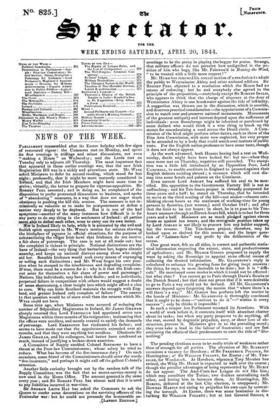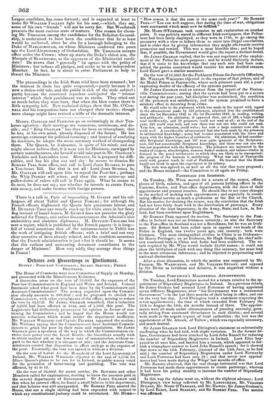The pending elections seem lobe really trials of weakness rather
than of strength for all parties. The elevation of Mr. SCARLETT occasions a vacancy for Horsham ; of Sir FREDERICK PoLLocit, for Huntingdon • of Sir WILLIAM FOLLETT, for Exeter ; of Mr. The- mes, for Woodstock. At Horsham, whence a Tory Member has retired, the Whig Mr. Mast is expected to walk over the course ; though the peculiar advantages of being represented by Mr. HURST do not appear. The Anti-Corn-law League do not like him; which may conciliate the Tories; two dislikes neutralizing each other, and letting him in between them. At Huntingdon, Mr. BARING, defeated at the last City election, is unopposed ; Mr. DOWNES MARTIN not caring to prejudice his own case by contest- ing the borough. At Exeter, there was some hesitation in dis- turbing Sir WILLIAM FOLLETT but at last General BRIGGS, League candidate, has come forward ; and is expected at least to make Sir WILLIAM FOLLETT fight for his seat,—which, they say, some of his own "friends" will not be sorry for. But Woodstock presents the most curious state of matters. One reason for choos- ing Mr. THESIGEE among the candidates for the Solicitor-General- ship, is understood to have been the confidence that he at least would be reelected, since he sits for a borough belonging to the Duke of MARLBOROUGH, on whom Ministers conferred two years ago the Lord-Lieutenancy of Oxfordshire. Mr. THESIGER accepts office under the Crown ; when up starts the Duke's eldest son, the Marquis of BLANDFORD, as the opponent of the Ministerial candi- date! He avows that " generally " he agrees with the policy of Ministers ; but refuses all pledges, and seeks to be an independent Member. In fact, he is about to enter Parliament to help to thwart the Ministers.



























